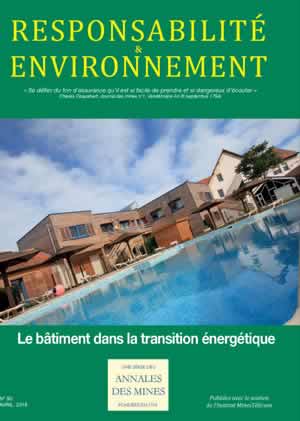|
 N° 90 - Avril 2018 - Le bâtiment dans la transition énergétique N° 90 - Avril 2018 - Le bâtiment dans la transition énergétique
Energy transition of Europe’s building stock
Implications for EU 2030 Sustainable Development Goals
By Dr Yamina SAHEB
Senior Climate and Energy Policy Analyst at Openexp
Dr Heinz OSSENBRINK
Former Head of the Renewables and Energy Efficiency Unit of the Joint Research Centre (JRC) of the European Commission (EC)
Dr Sandor SZABO
Renewables and Energy Efficiency Unit of the Joint Research Centre (JRC) of the European Commission (EC)
Dr Katalin BÓDIS
Joint Research Centre of the European Commission
and Strahil PANEV
International expert in energy efficiency policies
Energy transition of the EU building stock, from being an energy waster to being highly energy efficient and an energy producer, is a prerequisite for Europe’s carbon neutrality, as well as for meeting Europe’s Sustainable Development Goals (SDGs). Achieving these targets requires shifting the emerging energy renovation market from a market of step-by-step and shallow energy renovation financed by grants to a market of industrialized and holistic energy renovation leading to zero energy buildings financed by long-term loans. This paradigm shift is an opportunity for the construction industry to improve its productivity by industrializing the energy renovation process through the use of modern production technics and innovative technologies as well as business models. The industrialization of energy renovation will lead to cost reduction, making zero energy buildings affordable for all EU citizens, regardless of their income.
 Télécharger gratuitement l'article Télécharger gratuitement l'article
 Retour au sommaire Retour au sommaire
 N° 90 - April 2018 -The building sector in the energy transition N° 90 - April 2018 -The building sector in the energy transition
Energy transition of Europe’s building stock - Implications for EU 2030 Sustainable Development Goals
Dr Yamina Saheb,
Senior Climate and Energy Policy Analyst at Openexp,
Dr Heinz Ossenbrink,
Former Head of the Renewables and Energy Efficiency Unit of the Joint Research Centre (JRC) of the European Commission (EC),
Dr Sandor Szabo,
Renewables and Energy Efficiency Unit of the Joint Research Centre (JRC) of the European Commission (EC),
Dr Katalin Bódis,
Joint Research Centre of the European Commission,
and
Strahil Panev,
International expert in energy efficiency policies
Energy transition of the EU building stock, from being an energy waster to being highly energy efficient and an energy producer, is a prerequisite for Europe’s carbon neutrality, as well as for meeting Europe’s Sustainable Development Goals (SDGs). Achieving these targets requires shifting the emerging energy renovation market from a market of step-by-step and shallow energy renovation financed by grants to a market of industrialized and holistic energy renovation leading to zero energy buildings financed by long-term loans. This paradigm shift is an opportunity for the construction industry to improve its productivity by industrializing the energy renovation process through the use of modern production technics and innovative technologies as well as business models. The industrialization of energy renovation will lead to cost reduction, making zero energy buildings affordable for all EU citizens, regardless of their income.
 Retour au sommaire Retour au sommaire
|




